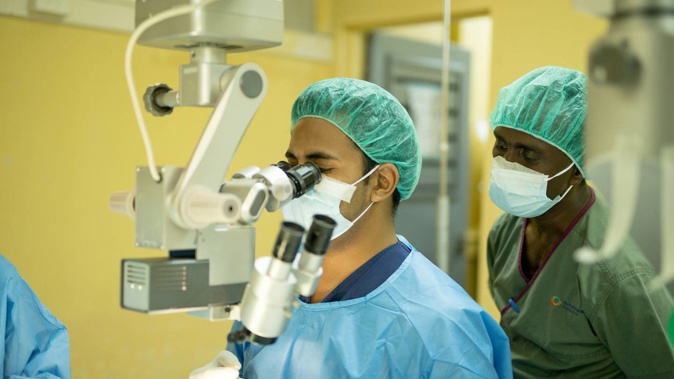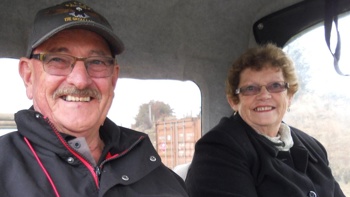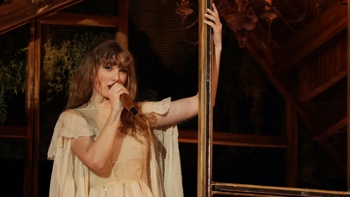
When a person who is starting to become blind or has been almost blind for several years, being given even the slightest chance to see again is life-changing.
"Their demeanour changes," eye doctor and specialist Dr Subash Bhatta says.
"When the people are blind for a long time, even a little vision can change a whole perspective about life."
Bhatta works at the Pacific Eye Institute based in Suva, Fiji, which was established by the Fred Hollows Foundation NZ in 2006.
The charity was established in 1992 by New Zealand-born eye surgeon Professor Fred Hollows and wife Gabi in a bid to restore sight to the needlessly blind. He died a year later from cancer.
Fred Hollows dedicated his life to that work and so the charity - which has set up several eye clinics around the Pacific region including in Vanuatu and Samoa - is much-loved for its work to help locals.
/cloudfront-ap-southeast-2.images.arcpublishing.com/nzme/PTV6VNSJI6FZBNQR5AMDZDHC7U.jpg)
Dr Subash Bhatta (far right) and staff at the Pacific Eye Institute in Suva, Fiji. Photo / Supplied
As well as eye care services, the institute also provides postgraduate eye care training for doctors and nurses.
Bhatta is passionate about what he does and shares the same mantra that Hollows had.
He believes everyone, no matter what background or social economic status, should have access to the basics - including eye healthcare that could very easily help prevent unnecessary blindness.
"When you see so many people like this around you who we could help...with all the resources that we have...
"And still, in so many parts of the world, such peoples out there who could have been helped but could not receive help because of [circumstances] - I really feel sad that maybe more of the global fraternity could come together to help these patients.
/cloudfront-ap-southeast-2.images.arcpublishing.com/nzme/EZDXYFRBSXIHNACA7RNJJ2B76Y.jpg)
Members of the public pictured at the Pacific Eye Institute in Suva, Fiji. Photo / Supplied
"Globally, if you look at the resources, we are not lacking. It's just not evenly distributed. Some people will have resources and some patients don't have even the basic resources."
An exciting development at the Fiji-based clinic, however, is set to help more people not just locally, but from other Pacific countries also, receive specialist eye care.
New surgical training has just started for phacoemulsification - a modern-day cataract surgery - and vitrectomy, which is a type of eye surgery that treats various problems with the retina and vitreous.
'In Western countries, these surgeries are the norm. But here, it's the sad reality that many people will lose their vision just because they can't afford the surgery'
This has been made possible with new equipment funded by Australia and will mean members of the public will have access to complex eye surgeries at the local Colonial War Memorial Hospital in Suva.
/cloudfront-ap-southeast-2.images.arcpublishing.com/nzme/VTOWUB73OFZVHOD6BPAQ5UIQWM.jpg)
People in Fiji and around the Pacific will be able to access more eye healthcare services at the Pacific Eye Institute in Suva. Photo / Fred Hollows Foundation
Before this, people needing specialist eye care would be told they needed to travel overseas to New Zealand, Australia or other countries.
"People were also going to India for these treatments," he said.
"The referral - it is a very time consuming process. It has to go through the Government and it's a very expensive services."
Some retinal disease surgeries can cost anything between $15,000 to $20,000 (NZD).
"When you couple that with the transportation costs, a person going with the patient and logistics and all these things, it's almost next to impossible for many patients to travel even to get their treatment.
"I have seen a lot of patients here go blind because...they could not afford the costs related to the services when they were referred. It really was a sad situation."
Bhatta said cataract problems make up the leading cause of preventable blindness all over the world and so eye programmes tended to focus on cataract surgeries.
Providing better eye healthcare for whole of Pacific region
But there are many other diseases that can cause blindness, he said, including retinal diseases caused by diabetes.
"Retinal diseases - if you have a problem in the retina and it's not [fixed] in time, you can't reverse time.
"In Western countries, these surgeries are the norm. But here, it's the sad reality that many people will lose their vision just because they can't afford the surgery because they have no access to them."
Leaving the disease untreated only causes decreased vision or, inevitably, total loss of vision.
But now they are slowly building a base at the Pacific Eye Institute where they can treat patients and train local doctors who can continue the services in future - in Fiji and the rest of the Pasefika region.
There are plans for the Fijian Ministry of Health and Medical Services to work with neighbouring Pacific Island nations so people from those respective nations can travel to Fiji and be treated rather than going further overseas for the same service.
Bhatta stressed how such a development was vital not only for Fiji but for the wider Pacific region.
"Once they get blind, another person has to continuously be with them. It's a big burden to the person, the family, society and even the country.
"It's very important we deal with these problems."
- Vaimoana Mase, NZ Herald
Take your Radio, Podcasts and Music with you









